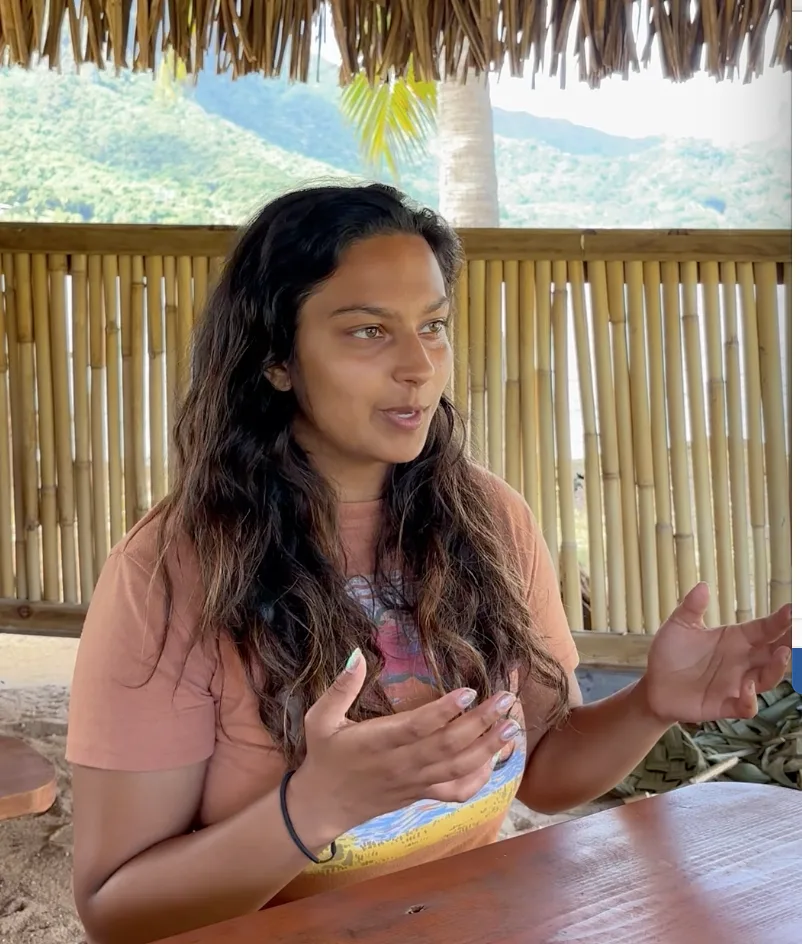Programs Blog
Resh on an Ocean Perspective

Date: May 20, 2025
Time: 1945
Location: Gump Marine Station, Mo‘orea
Weather: 70˚ F, Southern Cross clearly visible
This short interview is with Resh Mukherjee, from Claremont McKenna College.
What did you do on the last night aboard the ship, at anchor?
We did “swizzle”! This is a really fun talent show equivalent. Some people did real talents and others just did goofy acts. We drank punch out of coconut shells we had collected out at sea. Some people did personalized sea chanties or re-enacted past scenes from the ship. That’s what I did. It was really fun.
Do you have a sea story that sticks out in your mind?
Easter Sunday was the first day I went aloft, to the midpoint of the mast. I climbed up there with Ana. It was really funny because we were looking down and seeing all of the jellyfish, the Physalia in the water, and we were joking about how bad it would be to swim then. It was an amazing time, a beautiful view, perfect weather that day, which we hadn’t had for a lot of the trip so far. But so many jellyfish. I climbed down and Cap shouts, “Swim Call!” I was immediately like: “Nevermind! This is the perfect place to swim, actually.” We had a couple lookouts to spot any large ones and the swimming was amazing. No one got stung.
Do you feel that from this voyage your perspective has changed about either your individual relationship with the ocean, or our cultural relationship with the ocean?
Both. My perspective has changed on both.
Personally, compared to a lot of people in this program, I am kind of new to my enjoyment of marine science. I was always a more climate science-minded person, going into college. I only got into the ocean less than two years ago. After this voyage I think now I just know so much more about the diversity down there. I was actually reading this book while we were out there about bioluminescence in the ocean, and I was seeing it at the same time. It was really cool. I have so much appreciation now for how much diversity is out there. Beyond what’s useful to humans. Just what’s out there.
Culturally, I’m from outside Chicago—we’re not land-locked, we have Lake Michigan. But I didn’t see the ocean growing up. I’m from a place where people don’t see the ocean a ton. And there are other parts of the US with no large bodies of water and are completely land-locked. It’s just been really interesting thinking about that.

Recent Posts from the Ships
- Ocean Classroom 2024-A collaborative high school program with Proctor Academy
- Collaborations and Long-term Commitments: SEA’s Caribbean Reef Program Sets a Course for Coastal Programs that Compliment Shipboard Experiences.
- Sea Education Association students prepare for life underway using state of the art nautical simulation from Wartsila Corporation.
- SEA Writer 2022, Magazines From the Summer SEA Quest Students
- Technology@SEA: Upgrades Allow Insight into Ocean Depths
Programs
- Gap Year
- Ocean Exploration
- High School
- Science at SEA
- SEA Expedition
- SEAScape
- Pre-College
- Proctor Ocean Classroom
- Protecting the Phoenix Islands
- SPICE
- Stanford@SEA
- Undergraduate
- Climate and Society
- Climate Change and Coastal Resilience
- Coral Reef Conservation
- Marine Biodiversity and Conservation
- MBL
- Ocean Exploration: Plastics
- Ocean Policy: Marine Protected Areas
- Oceans and Climate
- Pacific Reef Expedition
- The Global Ocean: Hawai'i
- The Global Ocean: New Zealand